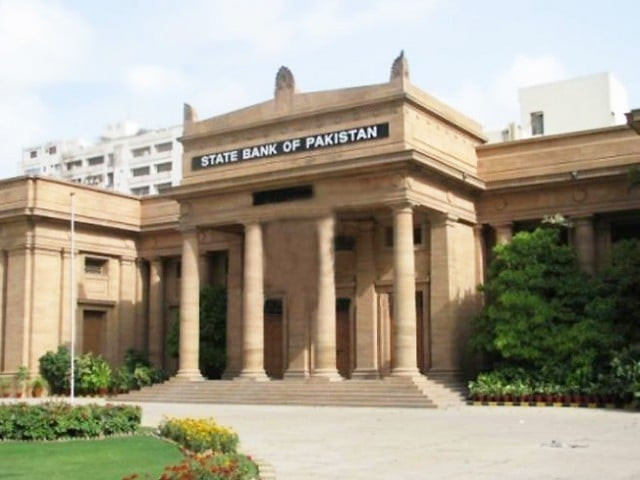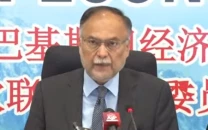NA panel approves State Bank bill
Rejects all but three recommendations of opposition, passes it with majority

The National Assembly Standing Committee on Finance approved on Monday one of the most critical pieces of legislation – the State Bank of Pakistan Amendment Bill – without reading it, while rejecting all recommendations of the opposition but three.
Headed by Pakistan Tehreek-e-Insaf’s (PTI) Faizullah Kamoka, the standing committee did not even read the statement of Objects and Reasons of the Bill and approved it with a majority after holding general discussion.
It was the first and last sitting of the standing committee on the issue of the SBP Amendment Bill 2021, tabled to meet a condition by the International Monetary Fund (IMF). The committee did not read the bill clause-by-clause despite repeated requests by the opposition.
Seven out of nine treasury members present in the meeting did not speak a single word on the bill. Only Dr Ramesh Kumar of the PTI spoke and gave two recommendations to set explicit inflation target and authorise the Parliament to remove the governor. But both of the recommendations were not made part of the bill.
Read: Gas prices rise as Russian pipeline gets stuck
The finance minister had suggested that it was critical to discuss the SBP independence and the Bill should not be passed in a hurry. The standing committee also did not incorporate Pakistan Muslim League-Nawaz (PML-N) MNA Ahsan Iqbal’s recommendation, which was also backed by Finance Minister Shaukat Tarin, to restrict the SBP governor’s term in the office to just five years for a single time against the proposal to have two terms of five years each.
The government has proposed radical changes in the SBP Act of 1956, seeking absolute autonomy for the central bank without ensuring accountability.
The Bill, which will now be taken up by the National Assembly for approval, seeks to allow the central bank to target price stability as primary objective but does not set the explicit inflation target. The new bill has given the autonomy to the SBP but neither the Parliament nor the federal government has the authority to remove the governor for missing the inflation target.
“When finance minister today cannot retain powers that he himself wants like the Monetary and Fiscal Policies Coordination Board (MFPCB) who would allow him to amend the Bill tomorrow,” said PML-N’s Ahsan Iqbal.
Tarin had said that if the governor “rebels” tomorrow after the approval of the bill, the government would bring new amendments in the SBP law to withdraw these powers.
On the proposal of Iqbal, the standing committee approved to include an amendment to bar the governor and deputy governors of the SBP for two years to seek an employment in any of the institutions that they have dealt with or negotiated during the term of their office.
The SBP governor also supported to put a bar on seeking employment for two years but said that the ban should also be extended to the members of the board of directors of the SBP.
The committee also approved that dual nationals cannot become governors and deputy governors of the SBP. The third and the last amendment that the standing committee incorporated was that the Parliament and its standing committees can call the governor SBP in meetings.
The central bank Governor Dr Reza Baqir opposed the amendment, saying that the standing committees would start calling the governor on issues that may not be so important and would not require his presence in the committee meetings.
Opposition recommendations
PPP’s Syed Naveed Qamar said that the new SBP bill is another extreme. He said that inflation cannot be controlled through monetary policy alone as there are fiscal and administrative aspects that relate to the federal government.
Ahsan Iqbal suggested that the deputy chairman of the Planning Commission should be member of the SBP board, which the government turned down. He advocated retaining the monetary and fiscal policies coordination board, which is also the wish of the finance minister, but the government turned down this proposal too.
The government-led standing committee also rejected the proposal to keep a window open for the government borrowings in case of calamities.
The prohibition of borrowing would throw the country at the mercy of the commercial banks, some of which are owned by foreigners, said Iqbal. Tarin said that the government wanted to retain the option to borrow but the IMF did not allow.
Through the SBP bill, the Parliament’s oversight is further weakened, said PPP’s Dr Nafeesa. After prohibition on the government borrowing, the private banks will become loan sharks, said Dr Shah.
The finance minister added that as a backup, the government has decided to increase the cash cushion from the current limit of Rs1 trillion to Rs1.5 trillion to Rs2 trillion to avoid any blackmailing in the hands of the banks.
However, the money that is used as a cushion by borrowing from the banks has interest cost for the taxpayers.
The opposition also proposed having an institutional arrangement instead of setting a liaison between the finance minister and the governor of SBP but the government did not agree.
Tarin said that the federal government will still exercise control over the SBP through eight directors that it will appoint on the board. He said that it does not matter whether the finance secretary has voting rights in presence of either of the other federal government appointees.
Read More: IMF seeks to renegotiate loan programme
The fulcrum of the new Bill is the SBP Board and its chairman is the governor, which is also against the best practices, said PML-N MNA Ali Pervaiz Malik. But the government did not agree to Malik’s proposal to separate the positions of the governor and the chairman of the board.
The PML-N also objected to giving the governor powers to appoint deputy governors. Tarin agreed that the governor can manipulate the process but said that the final say would still rest with the finance minister who can reject as many panels as he wishes until a suitable candidate is found.
The opposition also suggested amendment in the bill to limit the powers of the board to fix salaries of the governors and deputy governors, saying that the public sector cannot have salaries equal to the private sector. This recommendation was also turned down.
Ahsan Iqbal objected to binding the government to have prior consultation with the SBP before making changes in laws dealing with the central bank issues.
There has been abuse of regulators in the past but there has to be a difference between granting absolute autonomy and a reasonable autonomy, he said.
Ali Pervaiz suggested that there should be bipartisan mechanism in hiring and firing people in the SBP aimed at ensuring accountability by the Parliament.
His recommendation to remove the clause of taking no action against SBP officials on decisions taken in “good faith”, saying it will create a class of “super bureaucrats”, was also turned down.
“Under the circumstances, this (SBP bill) is the best we could do,” said Shaukat Tarin.
The finance minister and SBP governor represent banking and IMF institutions, respectively, said Qaiser Sheikh of the PML-N.
If the governor tomorrow wants to set the exchange rate at Rs200 to a dollar and interest rate at 12% no one can stop him, said Sheikh. The sweeping powers empower the governor to accommodate his friends from abroad and we have seen this episode in shape of hot foreign money, he added.
He said that under the Roshan Digital Account 23% return on investment is offered to overseas Pakistanis in shape of 7% interest rate and another 16% due to rupee devaluation in this fiscal year.
“Pakistan is offered to the looters and the Parliament is nowhere,” said the PML-N leader.



















COMMENTS
Comments are moderated and generally will be posted if they are on-topic and not abusive.
For more information, please see our Comments FAQ